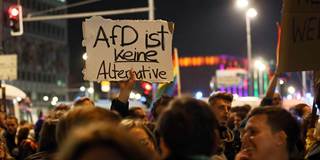Since the beginning of the Federal Republic, in 1949, one question has always haunted German politics: Could the experience of the interwar Weimar Republic be repeated, with the radical right triumphing again? Now that a far-right party has won seats in the Bundestag for the first time, the question has stepped out of the shadows.
PRINCETON – Germany’s election result presents an odd paradox. Chancellor Angela Merkel’s Christian Democratic Union is unquestionably the strongest party, and a new government without it is unthinkable. But both the CDU and its previous coalition partner, the Social Democrats (SPD), did poorly. Many SPD leaders’ initial reaction to their party’s 20.4% showing (down from 25.7% in 2013) has been to embrace a stint in the opposition.
That response – a flight from power – was characteristic of politics in interwar Germany’s short-lived democratic experiment, the Weimar Republic. Since the beginning of the Federal Republic, in 1949, one question has always haunted German politics: Could the Weimar experience be repeated, with the radical right triumphing again? Now that an extremist party, the Alternative für Deutschland (AfD), has won seats in the Bundestag for the first time since World War II, the question has stepped out of the shadows.
There are some obvious Weimar parallels. In Weimar, even in the relatively stable years of the mid- and late 1920s, before the onset of the Great Depression, parties were punished by voters when they participated in government, and rewarded when they styled themselves as alternative or protest parties. Between 1924 and 1928, the moderate right was in a coalition government, and then suffered massively; after 1928, the SPD was similarly punished for joining a coalition.

PRINCETON – Germany’s election result presents an odd paradox. Chancellor Angela Merkel’s Christian Democratic Union is unquestionably the strongest party, and a new government without it is unthinkable. But both the CDU and its previous coalition partner, the Social Democrats (SPD), did poorly. Many SPD leaders’ initial reaction to their party’s 20.4% showing (down from 25.7% in 2013) has been to embrace a stint in the opposition.
That response – a flight from power – was characteristic of politics in interwar Germany’s short-lived democratic experiment, the Weimar Republic. Since the beginning of the Federal Republic, in 1949, one question has always haunted German politics: Could the Weimar experience be repeated, with the radical right triumphing again? Now that an extremist party, the Alternative für Deutschland (AfD), has won seats in the Bundestag for the first time since World War II, the question has stepped out of the shadows.
There are some obvious Weimar parallels. In Weimar, even in the relatively stable years of the mid- and late 1920s, before the onset of the Great Depression, parties were punished by voters when they participated in government, and rewarded when they styled themselves as alternative or protest parties. Between 1924 and 1928, the moderate right was in a coalition government, and then suffered massively; after 1928, the SPD was similarly punished for joining a coalition.